
Animal Nutrition
Scope & Guideline
Transforming Animal Welfare Through Innovative Nutrition
Introduction
Aims and Scopes
- Nutritional Physiology and Biochemistry:
Research on how different nutrients affect physiological processes and biochemical pathways in animals, including metabolism, digestion, and absorption. - Feed Ingredients and Additives:
Investigation of various feed ingredients, including novel protein sources and additives, to enhance growth performance, health, and feed efficiency in livestock and aquaculture. - Gut Health and Microbiota:
Studies focusing on the role of gut microbiota in animal health, including the impact of dietary components on gut integrity, immune function, and microbiome composition. - Animal Performance and Welfare:
Research aimed at understanding how specific dietary interventions affect growth rates, reproductive performance, and overall animal welfare. - Sustainable Animal Production:
Exploration of nutrition strategies that promote sustainable practices in animal agriculture, including the reduction of environmental impacts and enhancement of nutrient utilization. - Disease Prevention and Management:
Studies investigating the nutritional strategies that prevent or mitigate diseases in livestock and aquaculture, including the use of probiotics and functional feeds. - Metabolomics and Multi-Omics Approaches:
Application of metabolomics and other multi-omics techniques to uncover the complex interactions between diet, metabolism, and health outcomes in various animal species.
Trending and Emerging
- Alternative Protein Sources:
There is a growing emphasis on exploring alternative protein sources, such as insect meal and plant-based proteins, to address sustainability and food security in animal agriculture. - Precision Nutrition and Personalized Diets:
Research focusing on precision nutrition, where diets are tailored to the specific needs of individual animals or production systems, is gaining traction. - Nutritional Immunology:
Emerging studies investigating the interplay between nutrition and immune function highlight the importance of diet in disease prevention and immune health. - Functional Feeds and Nutraceuticals:
Increasing interest in the use of functional feeds and nutraceuticals that provide health benefits beyond basic nutrition is becoming a prominent theme. - Sustainable Feeding Practices:
Research focusing on sustainable feeding practices, including the reduction of waste and the efficient use of feed resources, is increasingly relevant in the context of environmental concerns. - Microbiome and Gut Health Innovations:
Innovations in understanding the gut microbiome and its impact on animal health and performance are leading to new dietary strategies aimed at enhancing gut health. - Omics Technologies in Nutrition Research:
The application of omics technologies (genomics, proteomics, metabolomics) in nutrition research is expanding, providing deeper insights into dietary impacts on animal health.
Declining or Waning
- Traditional Feed Formulations:
Research focused on conventional feed formulations has seen a decrease as the field shifts towards more innovative, sustainable, and alternative feed sources. - Single Nutrient Studies:
There is a noticeable decline in studies investigating the effects of single nutrients in isolation, as the focus moves towards understanding the complex interactions of multiple dietary components. - Antibiotic Growth Promoters:
As the industry moves away from antibiotic growth promoters due to regulatory changes and consumer pressure, research in this area has diminished in favor of alternative strategies. - General Animal Nutrition Reviews:
The frequency of broad, non-specific reviews on animal nutrition has decreased, with a trend towards more specialized and targeted reviews that address specific issues or innovations. - Basic Metabolism Studies:
Research focused solely on basic metabolic processes without practical applications or implications for animal production is becoming less common, as applied research gains priority.
Similar Journals
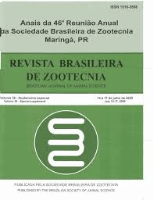
REVISTA BRASILEIRA DE ZOOTECNIA-BRAZILIAN JOURNAL OF ANIMAL SCIENCE
Exploring New Frontiers in Animal Science ResearchREVISTA BRASILEIRA DE ZOOTECNIA - BRAZILIAN JOURNAL OF ANIMAL SCIENCE is a leading open-access journal published by the esteemed Universidade Federal Viçosa, dedicated to advancing the field of animal science and agricultural research in Brazil and beyond. With an ISSN of 1516-3598 and an E-ISSN of 1806-9290, the journal has been a crucial resource since its inception in 1996, now looking ahead to its continued contribution through 2024. As a Q3-ranked journal in Animal Science and Zoology, it provides a platform for high-quality research, encouraging the dissemination of cutting-edge studies and innovative methodologies. The journal's impact in the scientific community is further reflected in its Scopus ranking within the 46th percentile, evidencing its importance in the global discourse around animal science. For researchers, professionals, and students alike, REVISTA BRASILEIRA DE ZOOTECNIA offers a valuable opportunity to engage with timely, peer-reviewed content and contribute to the advancement of knowledge in animal sciences.

European Poultry Science
Unlocking the potential of poultry science for global impact.European Poultry Science is a distinguished journal published by EUGEN ULMER GMBH CO, dedicated to advancing the field of poultry research and animal science. With an ISSN of 1612-9199, this journal provides an open-access platform for researchers and professionals to disseminate their findings on topics relevant to food animals, particularly poultry. Operating from Germany, the journal has established its significance in the scientific community, evidenced by its Q3 ranking in both the Animal Science and Zoology and Food Animals categories as of 2023. The journal's Scopus rankings further reflect its competitive standing within Veterinary Food Animals and Agricultural and Biological Sciences. As we anticipate the convergence of research from 2014 to 2024, European Poultry Science remains a vital resource for fostering innovation, sharing knowledge, and supporting the development of best practices within the poultry industry, making it an invaluable asset for academics, industry professionals, and students alike.
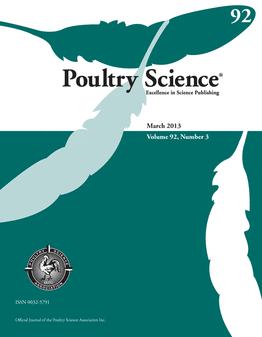
POULTRY SCIENCE
Exploring the science behind poultry excellence.POULTRY SCIENCE is a premier, peer-reviewed journal published by ELSEVIER, dedicated to advancing the field of avian biology and poultry production, encompassing a wide array of topics from genetics and physiology to nutrition and management practices. With an impressive impact factor and inclusion in the Q1 quartile for both Animal Science and Zoology as well as Miscellaneous Medicine, this journal is recognized as a leading source of high-quality research among its peers, ranking 17th out of 490 in its category. Since transitioning to Open Access in 2020, the journal has expanded its reach, allowing global accessibility to its significant findings, which are crucial for researchers, industry professionals, and students alike. The journal’s continuous publication from 1965 to 2024 underscores its long-standing commitment to fostering innovation in poultry science, making it an invaluable resource for anyone involved in the progression of this vital sector.

Brazilian Journal of Poultry Science
Innovative insights into poultry production and welfare.Brazilian Journal of Poultry Science, an esteemed publication of FACTA-FUNDACIO ARNCO CIENCIA TECNOLOGIA AVICOLAS, serves as a pivotal resource for researchers and professionals in the field of poultry science. Since its inception in 2000, the journal has maintained a commitment to Open Access, ensuring that high-quality research is accessible to a global audience. Based in Brazil, the journal provides a platform for innovative studies and advancements in animal science and zoology, achieving a commendable Q3 category ranking in 2023 and occupying the 270th position in Agricultural and Biological Sciences according to Scopus metrics. With a focus on disseminating robust scientific findings, the journal enhances understanding of poultry production, welfare, and genetics, crucial for the increasingly essential food production sector. Published continuously from 2002 to 2024, it remains dedicated to fostering knowledge exchange, supporting academic growth, and addressing the challenges faced by the poultry industry.
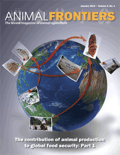
Animal Frontiers
Leading the Way in Cutting-edge Animal ResearchAnimal Frontiers, published by Oxford University Press Inc, stands as a premier open-access journal dedicated to advancing the field of animal science and zoology. Since its establishment in 2011, this journal has garnered impressive significance, achieving a Q1 ranking in both Animal Science and Zoology and Food Animals categories as of 2023, placing it at the forefront of research in these critical areas. With a Scopus ranking of #25 out of 490 in Agricultural and Biological Sciences and an exceptional #4 out of 39 in Veterinary Food Animals, it caters to a diverse audience of researchers, professionals, and students dedicated to animal welfare, food security, and sustainable practices. The journal's mission is to provide a high-impact platform for innovative research and discussions that enhance our understanding of animal health and productivity globally. Proudly based in India, Animal Frontiers is committed to maintaining rigorous academic standards while ensuring accessibility to vital research findings, making it an invaluable resource in the scientific community.
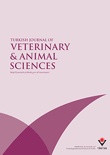
TURKISH JOURNAL OF VETERINARY & ANIMAL SCIENCES
Pioneering Research in Veterinary and Animal Sciences.TURKISH JOURNAL OF VETERINARY & ANIMAL SCIENCES is a distinguished peer-reviewed journal dedicated to advancing knowledge in the field of veterinary sciences and animal health. Published by the Tubitak Scientific & Technological Research Council Turkey, this journal provides a platform for high-quality research, fostering scientific inquiry that spans various aspects of veterinary medicine, animal biology, and animal husbandry. With an impact factor that reflects its growing influence within the Q3 category of Veterinary (miscellaneous) according to the 2023 rankings, it is strategically positioned in the academic landscape, ranked #112 out of 194 in the broader veterinary field. The journal is committed to open access publications, ensuring that research is accessible to a global audience, facilitating collaboration and knowledge sharing among researchers, professionals, and students. By covering a broad spectrum of topics from clinical research to veterinary policy, the TURKISH JOURNAL OF VETERINARY & ANIMAL SCIENCES plays a crucial role in enhancing the understanding and welfare of animal species, thereby contributing significantly to both scientific advancement and practical applications in veterinary practice.

Tropical Animal Science Journal
Elevating Standards in Tropical Animal ResearchTropical Animal Science Journal, ISSN 2615-787X, E-ISSN 2615-790X, is an esteemed open-access journal published by the Bogor Agricultural University, Faculty of Animal Science. Launched in 2018, this journal serves as a pivotal platform for disseminating high-quality research in the fields of Animal Science, Food Animals, and Veterinary Medicine. With its significant presence in Indonesia and a commitment to scientific innovation, it has achieved a Q3 ranking in Animal Science and Zoology and Food Animals, as well as a Q2 ranking in Veterinary (miscellaneous) as of 2023. The journal also enjoys favorable Scopus rankings, placing it in the 61st percentile for General Veterinary and demonstrating its relevance and impact in the academic community. As an advocate for open-access publishing since its inception, the journal enhances accessibility to critical research findings, making it an invaluable resource for researchers, professionals, and students alike who aim to advance their knowledge and contribute to the fields of tropical animal science.
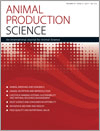
Animal Production Science
Connecting Research and Practice in Animal Production SystemsAnimal Production Science, published by CSIRO PUBLISHING, is a prestigious journal that caters to the fields of Animal Science and Food Science. With an ISSN of 1836-0939 and an E-ISSN of 1836-5787, the journal features high-quality research and reviews that are crucial for advancing the understanding and innovation of animal production systems. Recognized within the Q2 category of both Animal Science and Zoology, and Food Science, as per the 2023 Journal Rankings, Animal Production Science has achieved commendable Scopus rankings, placing it in the 68th and 48th percentiles in its respective categories. With converged years from 2009 to 2024, and an aim to disseminate knowledge that promotes sustainable practices, the journal is pivotal for researchers, professionals, and students devoted to animal production and food security. Exploring topics from livestock management to food quality, the journal offers valuable insights for enhancing productivity while considering welfare and environmental impact. For those seeking accessibility, the journal provides various open access options, encouraging a wider reach of its scholarly articles.

Revista MVZ Cordoba
Empowering researchers with accessible veterinary science insights.Revista MVZ Cordoba, an esteemed publication of UNIV CORDOBA, is a pivotal resource for researchers and practitioners in the fields of Animal Science, Zoology, and Veterinary Medicine. Established as an Open Access journal since 2000, it facilitates widespread accessibility of scholarly articles from Colombia, fostering global collaboration and knowledge dissemination. The journal has demonstrated its commitment to quality, holding Q4 quartile rankings in 2023 across various categories including Animal Science and Zoology, and Aquatic Science. Despite its current challenges in rankings, with percentiles in the lower brackets, it represents an important platform for the advancements in these disciplines, specifically catering to emerging research and insights. The journal's annual publication cycle from 2008 to 2024 ensures that it remains timely and relevant in covering contemporary issues within veterinary science and related areas. For researchers, professionals, and students, Revista MVZ Cordoba stands out as a valuable avenue for the exploration of veterinary sciences within a diverse academic landscape.

Indian Journal of Animal Research
Advancing Animal Science Through Innovative ResearchIndian Journal of Animal Research is a prominent publication in the field of animal science and veterinary medicine, established to advance the understanding of animal husbandry, biology, and health. Published by the AGRICULTURAL RESEARCH COMMUNICATION CENTRE, this journal has been contributing to the scholarly discourse since 2008, with a commitment to high-quality research dissemination. With its current Q3 ranking in both Animal Science and Zoology and Veterinary (miscellaneous) categories, it serves as a crucial platform for researchers aiming to share insights and innovations within these disciplines. Although it operates without open access, it remains widely recognized, fostering a collaborative academic environment. The journal's impact is underscored by its presence within the Scopus database, providing valuable rankings in both General Veterinary and Animal Science and Zoology fields. Researchers, professionals, and students interested in veterinary advancements and animal research will find this journal a valuable resource for the latest scientific findings and discussions. Join the community of scholars igniting progress in the vital realm of animal research.